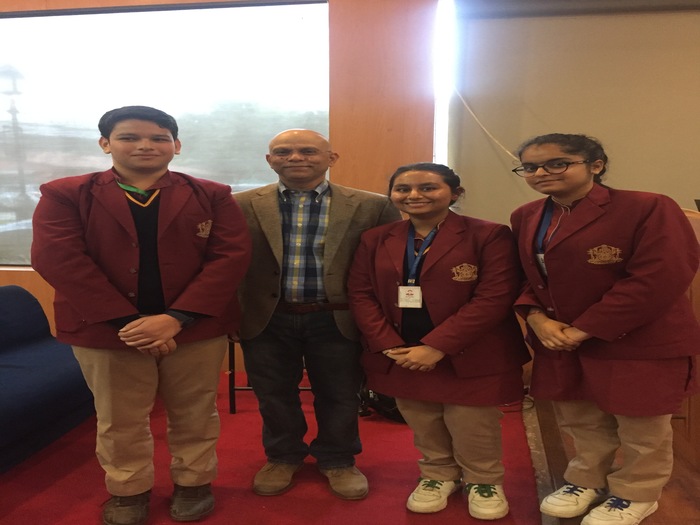Workshop on Autism for Psychology students
People suffer less from autism than they do from the way you treat them.
An interaction on the subject Autism Spectrum Disorder was organised on 21 January, 2020 by Dr Jitender Nagpal at Moolchand Hospital Dr Gagan Joshi ( Director Autism Spectrum Disorder Programme and Professor of Child Psychiatric at Harvard University) was invited to chair the same. The purpose underlying the exercise was to enhance the clinical potential of Autism as a disorder, talk about its management, new frontiers in its treatment and awareness about how our behaviour influences our health. The guests and dignitaries of the day were Dr H K Chopra ( Senior Consultant Cardiology, Moolchand Hospital), Dr Madhu Handa (Medical Administrator, Moolchand Hospital), Dr Harsh Kapoor ( Senior Consultant - Billiary Sciences, Gastroenterology) and Dr Rushi Arshad (Associate Professor and HOD, Department of Clinical Psychology, PGIMER-RML Hospital).
Three Psychology students of our School, namely Vishakha Baisoya of XI-D and Aryan Singh and Divijaa Sahni of XI-B were given a chance to attend the session. They were joined by students of other schools like DPS Mathura Road, Tagore International School, East of Kailash etc.
The seminar began with a discussion on a news headline in The Times of India on the day. The headline stated that according to the WHO, India is a country with the highest suicide rates in the south-east Asian region. It was discussed how mental health, to a very large extent, depends on behaviour and it is only when behaviour became negative that we expose ourselves to dangerous situations.
The session began with an understanding of the meaning of the word Autism which is derived from the Greek word autos, meaning self. It describes the condition in which a person is removed from social interactions or in other words becomes an isolated self. Although the interaction sought to make us aware that autism as a disorder is very different from its common understanding, it also answered questions like, What is the root cause of autism? Can we really cure it, readily or not? etcetera.
[gallery link="file" order="DESC"]
Some symptoms of autism that were brought up during the interaction included a person being socially disturbed, having a rigid nature, being intellectually very bright or being socially very active. It was stated that Autism can be of low or high functioning intensities and cues for people suffering from low intensity are socially blind. They are not able to read the expressions of others, are anxious, feel depressed and are bullied which drives some of them to suicide. It was further mentioned that people suffering from high functioning intensity cues are able to read gestures evidently but have troubles with social behaviour.
The discussion then shifted to variations in the definition of autism. For example, studies show that South Korea has the highest rate of autism in the world. The Koreans are brought up to not be socially very engaging or expressive. Therefore, it can be concluded that they are relatively not autistic and that every genetic pool (in this case South Korean) has its own standards of socio-emotional intelligence.
It was also pointed out that the teenage years are the most difficult for children with autism. They find it very difficult to fit into the normal crowd. It is also a phase when their autistic characteristics appear vividly.
The seminar concluded about treating autism with awareness. Mr. Joshi rightly said, We are born autistic but we take two different routes.
It was an enriching session which gave us immense knowledge about Autism and busted myths associated with the same. The session taught us that everything depends on our abilities or ways of dealing with the world.
Vishakha Baisoya XI-D













